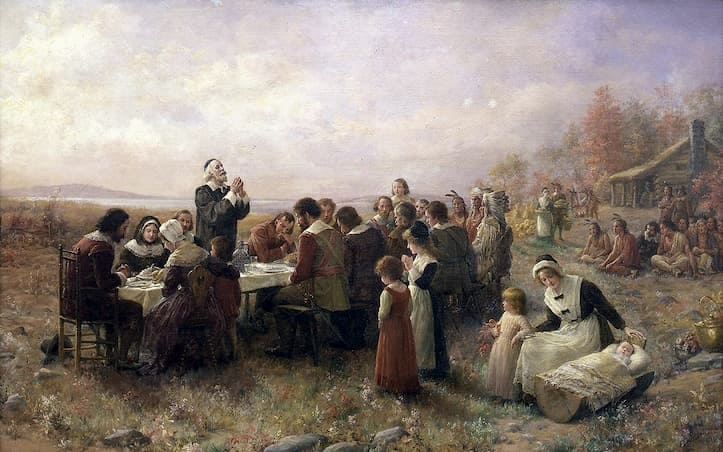Thanksgiving Day – America’s oldest, national holiday commemorates a feast from an abundant harvest reaped by the Pilgrims (discontented English Protestants called Separatists) of Plymouth Colony in 1621 after a winter of great suffering from starvation and disease. When the Pilgrims arrived in Plymouth in December 1620, they cleared some land and settled, but it was too late in the year to plant so that first winter they starved, with half the colony perishing. They were able to survive the following year through prayer, hard work, and help from local, indigenous Indians, especially from one named, Squanto, who taught them farming and fishing skills.
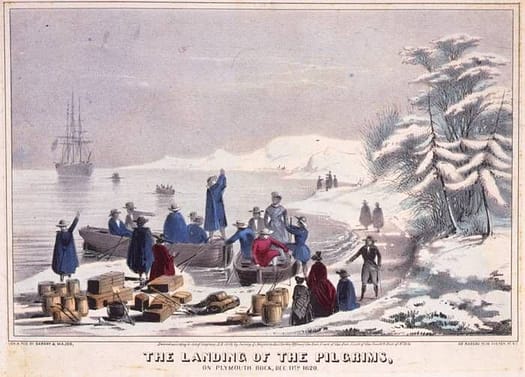
It, came…without either wind, or thunder, or any violence, and by degrees in that abundance, as that the earth was thoroughly wet and soaked therewith. Which did so apparently revive & quicken the decayed corn & other fruits, as was wonderful to see, and made the Indians astonished to behold; and afterwards the Lord sent them such seasonable showers, with interchange of fair warm weather, as, through his blessing, caused a fruitful & liberal harvest, to their no small comfort and rejoicing. For which mercy (in time convenient) they also set apart a day of thanksgiving. This being overslipt in its place, I thought meet here to insert the same.
From Governor Bradford’s written history, Of Plimouth Plantation
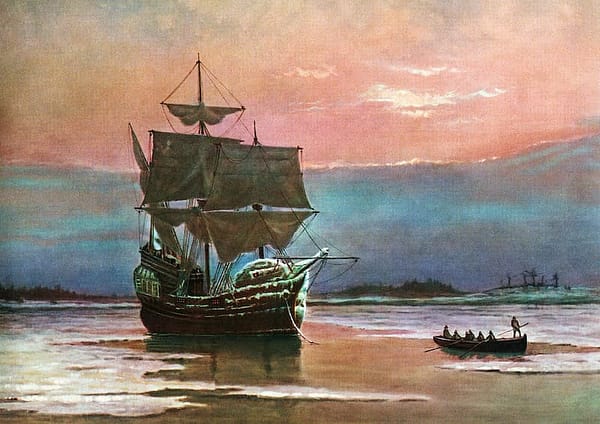
By William Formsby Halsall (1841-1919)
Painted in Massachusetts, 1882 | fineartamerica.com
Governor William Bradford (1590-1657) came to America in 1620 on the merchant ship called the Mayflower. He was elected Governor of Plymouth Colony in 1621 after the death of Deacon John Carver (1576-1621), and in celebration of God’s blessing for their plentiful crops, he proclaimed a day of thanksgiving. The First Thanksgiving was celebrated as a three-day feast and, henceforth, became a regular autumn event with each individual colony by the middle of the 1600s.
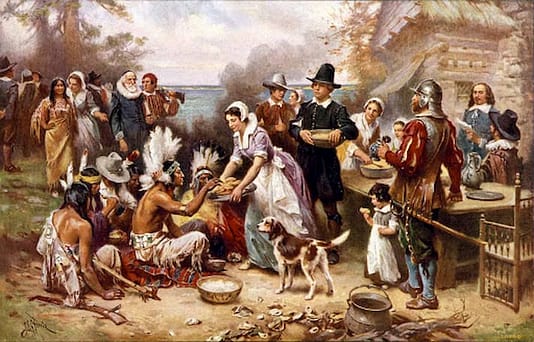
American painter: Jean Leon Gerome Ferris – 1915 | art.com
Our harvest being gotten, our governor (Bradford, ed.) sent four men on fowling, that so we might, after a special manner, rejoice together after we had gathered the fruit of our labors. They four in one day killed as much fowl as, with a little help beside, served the company almost a week. At which time, amongst other recreations, we exercised our arms, many of the Indians coming amongst us, and among the rest their greatest king, Massasoit, with some ninety men, whom for three days we entertained and feasted; and they went out and killed five deer, which they brought to the plantation, and bestowed on our governor, and upon the captain and others.
Edward Winslow’s (Pilgrim) letter of 11 December 1621 to a friend in England regarding the “First Thanksgiving.” It was later printed in a pamphlet that historians called Mourt’s Relation, but was lost during the Colonial period and then rediscovered in Philadelphia in 1820.
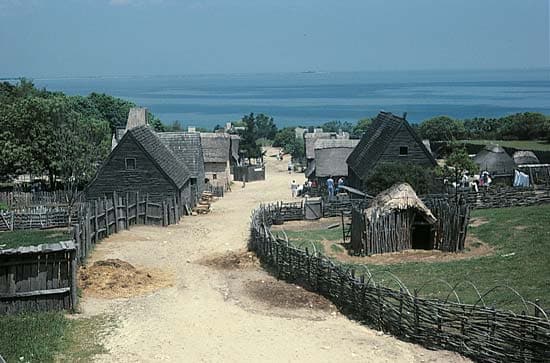
FIRST OFFICIAL NATIONAL THANKSGIVING
The first official, national Thanksgiving under the Constitution was proclaimed by George Washington (1732-1799) in 1789, but the custom eventually disappeared by 1815.
It is the duty of all nations to acknowledge the Providence of Almighty God, to obey His will, to be grateful for His benefits, and humbly to implore His protection and favor.
George Washington, Thanksgiving Proclamation, 3 October 1789
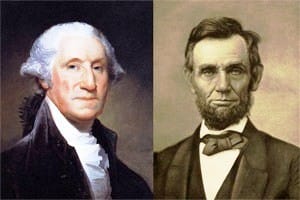
By the 1850s, almost every state and territory was celebrating Thanksgiving Day again. But it was not a national holiday, and Mrs. Sarah Josepha Hale (1788-1879), who was editor of the popular women’s magazine called Godey’s Lady’s Book, pushed to make it an annual holiday through petitioning national and state officials. Then in 1863, her efforts prevailed and she was able to persuade President Abraham Lincoln that such an annual family holiday would help reunite a war-torn country. And so the custom was revived by Lincoln on 26 November 1863, designating the date of observance to be the last Thursday of November – A Day of Thanksgiving.
Proclamation of Thanksgiving by the President of the United States of America
The year that is drawing toward its close has been filled with the blessings of fruitful years and healthful skies. To these bounties, which are so constantly enjoyed that we are prone to forget the Source from which they come, others have been added which are of so extraordinary a nature that they can not fail to penetrate and soften even the heart which is habitually insensible to the ever-watchful providence….
In the midst of a civil war of unequaled magnitude and severity, which has sometimes seemed to foreign states to invite and to provoke their aggression, peace has been preserved with all nations, order has been maintained, the laws have been respected and obeyed, and harmony has prevailed everywhere, except in the theater of military conflict, while that theater has been greatly contracted by the advancing armies and navies of the Union.
Needful diversions of wealth and of strength from the fields of peaceful industry to the national defense have not arrested the plow, the shuttle, or the ship; the ax has enlarged the borders of our settlements, and the mines, as well of iron and coal as of the precious metals, have yielded even more abundantly than theretofore.
Population has steadily increased notwithstanding the waste that has been made in the camp, the siege, and the battlefield, and the country, rejoicing in the consciousness of augmented strength and vigor, is permitted to expect continuance of years with large increase of freedom.
No human counsel hath devised nor hath any mortal hand worked out these great things. They are the gracious gifts of the Most High God, who while dealing with us in anger for our sins, hath nevertheless remembered mercy. It has seemed to me fit and proper that they should be solemnly, reverently, and gratefully acknowledged, as with one heart and one voice, by the whole American people. I do therefore invite my fellow-citizens in every part of the United States, and also those who are at sea and those who are sojourning in foreign lands, to set apart and observe the last Thursday of November next as a day of thanksgiving and praise to our beneficent Father who dwelleth in the heavens. And I recommend to them that while offering up the ascriptions justly due to Him for such singular deliverances and blessings they do also, with humble penitence for our national perverseness and disobedience, commend to His tender care all those who have become widows, orphans, mourners, or sufferers in the lamentable civil strife in which we are unavoidably engaged, and fervently implore the interposition of the Almighty Hand to heal the wounds of the nation and to restore it, as soon as may be consistent with the Divine purposes, to the full enjoyment of peace, harmony, tranquility, and union.
In testimony whereof I have hereunto set my hand and caused the seal of the United States to be affixed.
Abraham Lincoln (3 October 1863, passed by an Act of Congress)
PRESIDENT ROOSEVELT APPROVED OFFICIAL DAY FOR THANKSGIVING
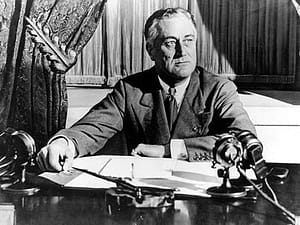
Then in 1933, President Franklin D. Roosevelt appointed Thursday, the thirtieth day of November 1933, to be the National Day of Thanksgiving, only to be changed again in 1941. In a joint resolution with Congress on 26 December 1941, approval was granted that the 23rd Day of November 1944 was to be the day for national thanksgiving. President Roosevelt also called upon the people of the United States saying,
“…to observe it by bending every effort to hasten the day of final victory and by offering to God our devout gratitude for His goodness to us and to our fellow men.”
Thanksgiving Day was originally influenced by the faith practices of Puritan New England, which was based on strict Calvinist doctrine. These Puritans believed that a proper “Thanksgiving” should be set aside as a separate “holy day” from the Sabbath for prayer and devout humiliation in thankfulness to God. This first Thanksgiving feast was prepared for a table of honored guests such as the Plymouth Colony leaders and the local native leaders: Massasoit (“Great Leader” or Ousamequin “Yellow Feather”) and the chief of Pokanoket (the area at the head of Narragansett Bay). This table of food would have included the meal’s foundation of wildfowl, venison, turkeys, and Indian corn, but other foods also known to have been possibly available from either the Mayflower or in Plymouth, would have been spices, Dutch cheese, wild grapes, lobster, cod, native melon, pumpkin, and rabbit.
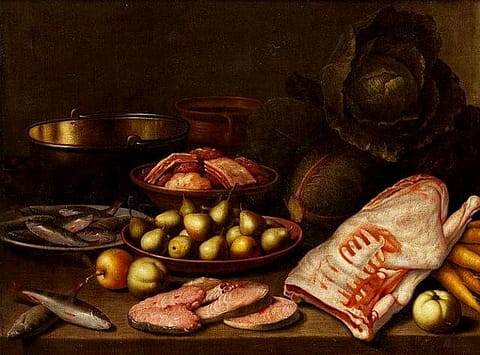
The original Thanksgiving menu has been modified over generations according to America’s regions and various cultures, but largely the table food consists of local crops, animals, and seafood that may include ethnic specialty foods. Turkey still reigns for most of us as the traditional meat for the holiday meal, but the traditional Southern Thanksgiving menu offers corn, sweet potatoes, pork, ham, sweet potato casseroles, pies and puddings, biscuits, and cornbread dressing. Ambrosia (a layered fruit salad) is another southern contribution that has become very popular at many holiday tables. Let’s not forget the desserts because they were different too. The New England Pilgrims served minced, apple, and pumpkin pies, whereas the South served regional cakes, pies, puddings, and numerous cobblers.
Commentary
During the 20th century, Thanksgiving Day was recognized as the start to the Christmas holiday season and although it still is a day for family reunions and food, the initial importance of the Pilgrim’s religious and civil sentiment has become more about the meal and less about thankfulness to God.
Many people today are frustrated, overwhelmed, stressed, and angry coping with the difficulties in their lives. I see it every day. Our nation is turning into a country that no one recognizes because our government is corrupt and greedy, and its people have turned away from God. The less we seek God, the less He will make His presence known to us, and the less we will see His blessings. The Pilgrims knew His blessings, George Washington knew His blessings, and Abraham Lincoln came to recognize the need to give thanks and praise to our “beneficent Father” even during suffering.
Thanksgiving Day should be a day that we remember God’s blessings, and to give thanks to Him even in our times of misfortune. Our humble thankfulness to God allows us to focus our attention on Him instead of our condition. So this Thanksgiving Day I will have a grateful heart for all that God allows, gives, and controls in my life, and I will trust in Him whatever comes my way.
References
http://www.plimoth.org/learn/MRL/read/thanksgiving-history
Lillback, P.A. 2006. George Washington’s Sacred Fire. Pp. 207.
Updated 2020
